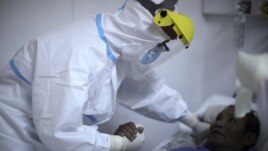28 July 2020
Even before the new coronavirus reached Argentina, health care workers there were already severely overworked. Most were often working more than 12 hours a day at several jobs just to survive the country's inflation.
The health crisis has caused even harder days on the job. The workers are now caring for the seriously ill. And they are trying to comfort patients who are dying of COVID-19, unable to say goodbye to family and friends.
Some workers still go home at night to their families, after taking safety measures. Others, fearing they will spread the virus to loved ones, have moved into hotels. Some have sent their children to live with relatives.

Dr. Matias Norte comforts a patient infected with COVID-19 at a hospital in Buenos Aires, Argentina, Saturday, July 18, 2020. (AP Photo/Natacha Pisarenko)
Dr. Matías Norte is a surgeon who specializes in cancer cases. But he is also helping treat COVID-19 cases at the three hospitals where he works. He sometimes has to drive an hour to get home in the capital city of Buenos Aires.
Norte says he feels so happy when he gets home each day that he forgets everything. But a kiss from his wife, Silvina Cáceres Monié, must wait until he showers.
Nurse Andrea Cortes also goes home after work to be with her partner, Ariel. But they have not kissed or fully held each other in nearly four months. She also has not seen her 27-year-old daughter for nearly that long.
Cortes works an average of 17 hours a day at two hospitals in Buenos Aires. She worries all the time about bringing the virus home. Cortes says the fear makes her "hold this distance with the family until it's all over because I love them and I have to take care of them."
Doctors, nurses and other health workers make up seven percent of the more than 130,000 confirmed infections reported by Argentina's government.
Juan José Comas completed his medical education last year but still must do training before taking his final examination. Since the start of the health crisis, he has treated a lot of patients.
Comas tested positive for the coronavirus but did not show signs of it. He has been sharing a hotel room with three doctors since leaving his parents' home in April to protect them. He told The Associated Press that he has gone a few times to visit his parents "behind the gate."
It has been three months since nurse Marcela Brancati last saw her 9-year-old daughter, Agostina, in person. Now, she only sees her in photos sent on WhatsApp by her mother, who is caring for the girl.
"We've never been apart so long. It's very difficult," Brancati says. "Sometimes she calls me crying. She can't stand it and she wants to go back (home)."
I'm Alice Bryant.
The Associated Press reported this story. Alice Bryant adapted it for Learning English. Hai Do was the editor.
________________________________________________________________
Words in This Story
comfort – v. to cause someone to feel less worried, upset or frightened
surgeon – n. a doctor who performs operations that involve cutting into someone's body in order to repair or remove damaged or diseased parts
shower – v. to wash yourself by using a shower
nurse – n. a person who is trained to care for sick or injured people and who usually works in a hospital or doctor's office
positive – adj. showing the presence of a particular germ, condition, or substance
gate – n. a place in a wall or a fence that has a movable part which can be opened or closed like a door